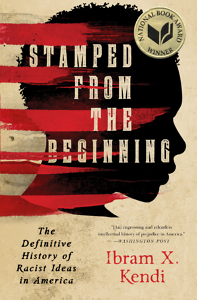Who’s Responsible for Changing Racist Minds?
Ibram X. Kendi will discuss his National Book Award-winning history of racism at the Nashville Public Library
Ibram X. Kendi’s Stamped from the Beginning, winner of the 2016 National Book Award in nonfiction, is an invaluable compass in any exploration of the history of race in America. The book is astonishing for its ingenious structure, breadth of research, wealth of anecdote, and engaging conversational voice. Kendi navigates familiar channels here, but his take on racist ideas in this country carries us closer than ever before to the source of the scourge behind our deepest conflicts.
 Stamped from the Beginning considers five major figures from European colonization to the present, people who shaped the myriad ways we understand and discuss race today: Cotton Mather, Thomas Jefferson, William Lloyd Garrison, W.E.B. Du Bois, and Angela Davis. This structure provides a conventional chronological through-line to the discussion, but it also allows Kendi to detour in ways that illuminate the importance of half-forgotten people and moments.
Stamped from the Beginning considers five major figures from European colonization to the present, people who shaped the myriad ways we understand and discuss race today: Cotton Mather, Thomas Jefferson, William Lloyd Garrison, W.E.B. Du Bois, and Angela Davis. This structure provides a conventional chronological through-line to the discussion, but it also allows Kendi to detour in ways that illuminate the importance of half-forgotten people and moments.
In Kendi’s telling, Cotton Mather, prominent theologian of colonial New England, tapped many racist notions brought from England by his grandfather and fleshed out by his own influential father, Increase: blacks were clearly inferior, but their souls were snow-white and worthy of salvation. Samuel Sewall, one of the first Salem judges to recant his role in the trials, went a step further, issuing a public denunciation of slavery in 1700, but such early flickers of abolition died quickly—the colonies’ economic growth depended on free labor.
Thomas Jefferson rejected Puritan ghouls and goblins, but his views on race were complicated and often contradictory, and some of Kendi’s best work falls in this section. His discussion of Jefferson’s age includes a consideration of Phillis Wheatley, an enslaved poet who learned Latin and Greek as a child and published her first poem at only thirteen. When she was seeking a publisher for her collection, a cadre of skeptical Bostonians met with her to test her knowledge of the classical allusions in the poems attributed to her. Wheatley “dazzled” them, according to Kendi, and they unanimously signed a document certifying her work. She failed to find a publisher in the colonies, but Poems on Various Subjects debuted in London in 1773, a year after slavery was abolished in England, earning begrudging admiration from that paragon of the Enlightenment and horrible racist Voltaire.
 In 1829, just three years after Jefferson’s death at Monticello, the dynamic William Lloyd Garrison electrified the nascent abolition movement with a call for immediate emancipation (though as Kendi shows, Garrison did not mean immediate equality). As Stamped from the Beginning moves into the Civil War, Kendi skillfully depicts the tensions between Frederick Douglass and the war-weary Lincoln, as well as a North conflicted over the shedding of white blood for slave liberation. Meanwhile, Garrison himself was inching toward a call for full equality: “Let us see, in every slave, Jesus Himself,” he cried out at a Fourth of July picnic for abolitionists in 1861.
In 1829, just three years after Jefferson’s death at Monticello, the dynamic William Lloyd Garrison electrified the nascent abolition movement with a call for immediate emancipation (though as Kendi shows, Garrison did not mean immediate equality). As Stamped from the Beginning moves into the Civil War, Kendi skillfully depicts the tensions between Frederick Douglass and the war-weary Lincoln, as well as a North conflicted over the shedding of white blood for slave liberation. Meanwhile, Garrison himself was inching toward a call for full equality: “Let us see, in every slave, Jesus Himself,” he cried out at a Fourth of July picnic for abolitionists in 1861.
Garrison’s illustrious life overlapped with that of W. E. B. Du Bois by only eleven years, and yet Du Bois’s famous “Talented Tenth” owed a debt to Garrison. Kendi adroitly depicts the arc of Du Bois’s own lengthy career and the cultural shifts that kept occurring right up to his death in 1963. Ironically Du Bois’s brilliant scholarship contributed to what Kendi calls “uplift suasion”—the idea that blacks can overcome inherent prejudice in whites only by competing as their intellectual and business equals: “Black people, apparently, were responsible for changing racist White minds,” Kendi writes. “White people, apparently, were not responsible for their own racist mentalities.”
Less than a month after Du Bois’s death in 1963, the bombing of the Sixteenth Street Baptist Church in Birmingham, Alabama, killed four young African-American girls and escalated racial hostilities in the South. Angela Davis, a Birmingham native and Brandeis student, read the news while studying in Europe; she’d personally known three of the four girls. Galvanized, she became one of the great civil-rights activists and feminists of the twentieth century. Although she recedes from view from time to time, Kendi uses her story as a vehicle for discussing the roller-coaster ride of the past few decades, with cameo appearances from Bill and Hillary Clinton and Barack Obama.
In the wake of Trayvon Martin, Black Lives Matter, and the incarceration crisis, Kendi argues that black people should divorce themselves from white opinions and attitudes and claim their selfhood on their own terms. The scope of his storytelling and the meticulous analysis that undergirds it are important additions to a national conversation about race, and never more relevant than now.
To read Chapter 16’s interview with Ibram X. Kendi, click here.
 Hamilton Cain is the author of This Boy’s Faith: Notes from a Southern Baptist Upbringing and a finalist for a 2006 National Magazine Award. A native of Chattanooga, he lives with his family in Brooklyn, New York.
Hamilton Cain is the author of This Boy’s Faith: Notes from a Southern Baptist Upbringing and a finalist for a 2006 National Magazine Award. A native of Chattanooga, he lives with his family in Brooklyn, New York.


